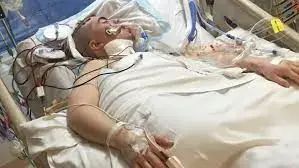- Home
- Medical news & Guidelines
- Anesthesiology
- Cardiology and CTVS
- Critical Care
- Dentistry
- Dermatology
- Diabetes and Endocrinology
- ENT
- Gastroenterology
- Medicine
- Nephrology
- Neurology
- Obstretics-Gynaecology
- Oncology
- Ophthalmology
- Orthopaedics
- Pediatrics-Neonatology
- Psychiatry
- Pulmonology
- Radiology
- Surgery
- Urology
- Laboratory Medicine
- Diet
- Nursing
- Paramedical
- Physiotherapy
- Health news
- Fact Check
- Bone Health Fact Check
- Brain Health Fact Check
- Cancer Related Fact Check
- Child Care Fact Check
- Dental and oral health fact check
- Diabetes and metabolic health fact check
- Diet and Nutrition Fact Check
- Eye and ENT Care Fact Check
- Fitness fact check
- Gut health fact check
- Heart health fact check
- Kidney health fact check
- Medical education fact check
- Men's health fact check
- Respiratory fact check
- Skin and hair care fact check
- Vaccine and Immunization fact check
- Women's health fact check
- AYUSH
- State News
- Andaman and Nicobar Islands
- Andhra Pradesh
- Arunachal Pradesh
- Assam
- Bihar
- Chandigarh
- Chattisgarh
- Dadra and Nagar Haveli
- Daman and Diu
- Delhi
- Goa
- Gujarat
- Haryana
- Himachal Pradesh
- Jammu & Kashmir
- Jharkhand
- Karnataka
- Kerala
- Ladakh
- Lakshadweep
- Madhya Pradesh
- Maharashtra
- Manipur
- Meghalaya
- Mizoram
- Nagaland
- Odisha
- Puducherry
- Punjab
- Rajasthan
- Sikkim
- Tamil Nadu
- Telangana
- Tripura
- Uttar Pradesh
- Uttrakhand
- West Bengal
- Medical Education
- Industry
Saline as effective as balanced solutions for keeping Critically Ill patients alive: NEJM Study

New research on intravenous fluids used in intensive care shows that commonly used saline is as effective at keeping people alive and their organs functioning as more expensive balanced solutions.
A balanced multielectrolyte solution (BMES) is not more effective than saline to reduce the risk of death or acute kidney injury among critically ill adults in the ICU, according to a study published in the New England Journal Of Medicine.
Whether the use of balanced multielectrolyte solution (BMES) in preference to 0.9% sodium chloride solution (saline) in critically ill patients reduces the risk of acute kidney injury or death is uncertain.
In a double-blind, randomized, controlled trial, we assigned critically ill patients to receive BMES (Plasma-Lyte 148) or saline as fluid therapy in the intensive care unit (ICU) for 90 days. The primary outcome was death from any cause within 90 days after randomization. Secondary outcomes were receipt of new renal-replacement therapy and the maximum increase in the creatinine level during ICU stay.
The results of the study are:
A total of 5037 patients were recruited from 53 ICUs in Australia and New Zealand — 2515 patients were assigned to the BMES group and 2522 to the saline group. Death within 90 days after randomization occurred in 530 of 2433 patients (21.8%) in the BMES group and in 530 of 2413 patients (22.0%) in the saline group, for a difference of −0.15 percentage points (95% confidence interval [CI], −3.60 to 3.30; P=0.90). New renal-replacement therapy was initiated in 306 of 2403 patients (12.7%) in the BMES group and in 310 of 2394 patients (12.9%) in the saline group, for a difference of −0.20 percentage points (95% CI, −2.96 to 2.56). The mean (±SD) maximum increase in serum creatinine level was 36.6±94.0 μmol per liter (0.41±1.06 mg per deciliter) in the BMES group and 36.1±90.2 μmol per liter (0.41±1.02 mg per deciliter) in the saline group, for a difference of 0.5 μmol per liter (95% CI, −4.7 to 5.3) (0.01 mg per deciliter [95% CI, −0.05 to 0.06]). The number of adverse and serious adverse events did not differ meaningfully between the groups.
Thus, the researchers concluded that they found no evidence that the risk of death or acute kidney injury among critically ill adults in the ICU was lower with the use of BMES than with saline.
Reference:
Balanced Multielectrolyte Solution versus Saline in Critically Ill Adults by Simon Finfer, et al. published in the New England Journal Of Medicine.
https://www.nejm.org/doi/full/10.1056/NEJMoa2114464
Dr. Shravani Dali has completed her BDS from Pravara institute of medical sciences, loni. Following which she extensively worked in the healthcare sector for 2+ years. She has been actively involved in writing blogs in field of health and wellness. Currently she is pursuing her Masters of public health-health administration from Tata institute of social sciences. She can be contacted at editorial@medicaldialogues.in.
Dr Kamal Kant Kohli-MBBS, DTCD- a chest specialist with more than 30 years of practice and a flair for writing clinical articles, Dr Kamal Kant Kohli joined Medical Dialogues as a Chief Editor of Medical News. Besides writing articles, as an editor, he proofreads and verifies all the medical content published on Medical Dialogues including those coming from journals, studies,medical conferences,guidelines etc. Email: drkohli@medicaldialogues.in. Contact no. 011-43720751


